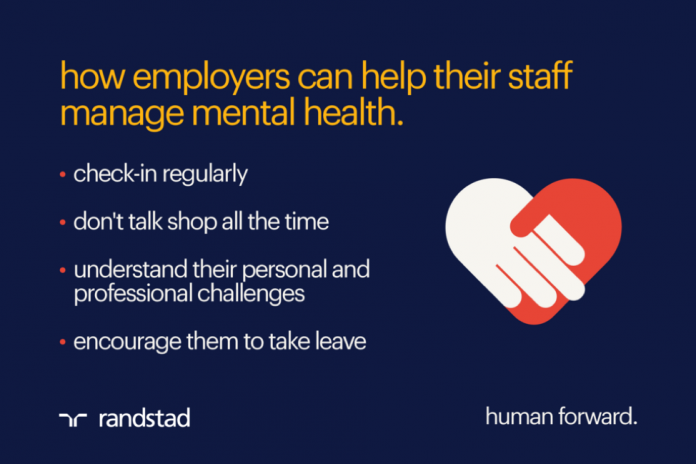In a recent workforce monitoring survey, nearly 9 of 10 respondents in Malaysia said that the COVID-19 pandemic has empowered them to improve their work-life balance. 2 of 3 employees felt more stressed during the pandemic. The results were released by Randstad – the world’s leading human resources solutions agency – in their H2 2021 Work Monitor survey in Malaysia. The bi-annual survey highlights the workforce’s latest sentiments and perceptions of the job market in Malaysia.
After working from home for most of the pandemic, employees in Malaysia may have gained a different perspective on work. Over the past 18 months, more than 3 in 5 Malaysian respondents have reassessed how work fits into their personal schedules. 2 in 3 respondents said that they are experiencing higher stress levels since the pandemic began and want to make changes to their work life. Ever since the pandemic started in 2020, mental health well-being has gained importance amongst the working population. Due to social restrictions, many employees decided to spend more time working beyond their stipulated office hours to keep busy. However, by not getting enough rest, employees may start to feel overwhelmed and stressed.
As hybrid and remote working become more normal in the new world of work, employers need to be able to support their employees’ well-being and mental health. This presents an opportunity for bosses and managers to step in and offer support to help improve their employees’ well-being.
Why is work-life balance so important? Having a good work-life balance helps to reduce mental stress and burnout. Furthermore, striking that balance will undoubtedly help employees work more productively and efficiently while maintaining mental wellness as well.
For example, managers can help their employees manage their workload and avoid burnout by reminding their staff to take regular breaks and log off after working hours. Bosses should also recognise their workers’ contributions to help them feel seen and valued. Instead of jumping into the agenda as soon as the meeting starts, managers can ask employees questions about how they are coping with work or how they plan to spend their weekends.
By making an effort to connect with your employees, you’ll also get to foster a stronger and trusted relationship with them. You can offer your support by delegating their tasks to other team members if they feel overwhelmed by their piling workload so that they can work towards striking a balance between professional and personal priorities. You could also encourage them to make use of holiday days if they start to show signs of burnout, and step in to cover some of their work. Employees want to work with a boss who would go above and beyond to protect their interests while guiding them towards their goals and aspirations.
94% of malaysian workers said that the experiences of the pandemic have made them want more flexibility in their jobs and careers. The pandemic has led many Malaysians to reconsider their life priorities and career goals. More than 4 in 5 respondents said that they have more clarity on both their personal and professional goals since the start of the pandemic. Career priorities have changed over the years as well. Job seekers are no longer just looking for a competitive salary. The survey data showed that 64% of respondents want a safe work environment, 52% want the opportunity to do meaningful work and 49% want job flexibility to accommodate commitments outside of work.
Employees in Malaysia are starting to see more value in flexible work arrangements so that they can work from home or remotely, which doesn’t just help reduce commuting time, but also increase the time that they get to spend with their family and friends.
People are reassessing their career choices in their pursuit of their professional and personal development as well as to understand their role in the changing world of work. For example, contracting job opportunities are becoming more attractive as employees get the chance to work in different environments and develop their skills quickly. Contract roles also offer a higher level of flexibility where they can negotiate their working hours, or take breaks between their contracting stints to rest.
The Randstad 2H 2021 Workmonitor survey was conducted in September 2021 across 34 markets around the world with a minimum of 800 respondents in each market. The Randstad Work Monitor survey is conducted twice a year to discover the changes in candidates’ expectations and challenges to help organisations like yours develop a talent attraction and an effective employee engagement strategy that works.




















